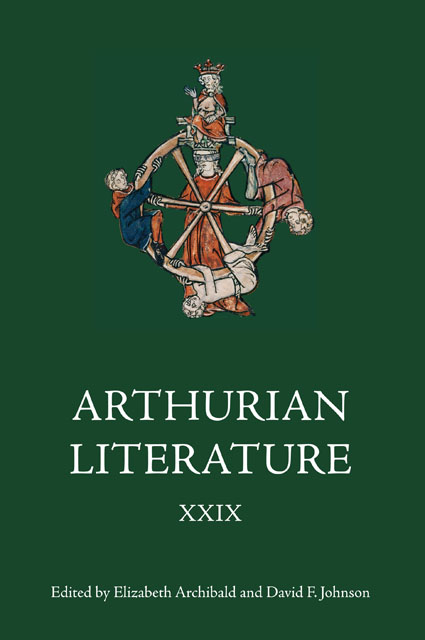Book contents
- Frontmatter
- Contents
- List of Illustrations
- General Editors’ Foreword
- List of Contributors
- I Edward III’s Abandoned Order of the Round Table
- II King Arthur’s Tomb at Glastonbury: The Relocation of 1368 in Context
- III Benedict of Gloucester’s Vita Sancti Dubricii: An Edition and Translation
- IV New Evidence for an Interest in Arthurian Literature in the Dutch Low Countries in the Fifteenth and Early Sixteenth Centuries
- V Malory’s Source-Manuscript for the First Tale of Le Morte Darthur
- VI Malory’s Sources – and Arthur’s Sisters – Revisited
- VII Peace, Justice and Retinue-Building in Malory’s ‘The Tale of Sir Gareth of Orkney’
- VIII Mapping Malory’s Morte: The (Physical) Place and (Narrative) Space of Cornwall
- IX The Fringes of Arthurian Fiction
- Contents of Previous Volumes
VIII - Mapping Malory’s Morte: The (Physical) Place and (Narrative) Space of Cornwall
Published online by Cambridge University Press: 14 February 2023
- Frontmatter
- Contents
- List of Illustrations
- General Editors’ Foreword
- List of Contributors
- I Edward III’s Abandoned Order of the Round Table
- II King Arthur’s Tomb at Glastonbury: The Relocation of 1368 in Context
- III Benedict of Gloucester’s Vita Sancti Dubricii: An Edition and Translation
- IV New Evidence for an Interest in Arthurian Literature in the Dutch Low Countries in the Fifteenth and Early Sixteenth Centuries
- V Malory’s Source-Manuscript for the First Tale of Le Morte Darthur
- VI Malory’s Sources – and Arthur’s Sisters – Revisited
- VII Peace, Justice and Retinue-Building in Malory’s ‘The Tale of Sir Gareth of Orkney’
- VIII Mapping Malory’s Morte: The (Physical) Place and (Narrative) Space of Cornwall
- IX The Fringes of Arthurian Fiction
- Contents of Previous Volumes
Summary
Place is three-fourths of time.
Ursula Le Guin‘Walking in Cornwall: A Poem for the Solstice’
Hit befell in the dayes of Uther Pendragon, when he was kynge of all Englond and so regned, that there was a mighty duke in Cornewaill that held warre ageynst him long tyme, and the duke was called the duke of Tyntagil. And so by means kynge Uther send for this duk, charging hym to brynge his wyf with hym, for she was called a fair lady and a passing wise, and her name was called Igrayne. (7.1–7)
Thus begins Sir Thomas Malory’s Morte Darthur, the most comprehensive, coherent and consecutively-ordered single-author treatment of the Arthurian legend until the modern period. Drawing on multiple French and English sources, Malory re-arranged, de-interlaced and reworked his source material to tell the story of King Arthur from the events surrounding his conception and birth to his death, including the immediate situational aftermath of the realm he had established and the fates of the knights upon whom he had depended. Malory’s text is in many respects contradictory, vexed and divided; a work that seems to celebrate the values of chivalry while simultaneously and contradictorily mourning their self-destructiveness. Written during the tumultuous time of the Wars of the Roses by a knight-prisoner incarcerated for some very unknightly behaviour, and existing in both manuscript and print versions, the Morte Darthur is a text fraught with – and implicated in – questions of borders and limits, boundaries and identities. That this is so is heralded from the outset, when Malory tells us that ‘kynge of all Englond’ Uther Pendragon is engaged in a conflict with the Duke of Cornwall. The very fact of this opposition is significant, as technically Cornwall should be considered part of ‘Englond’ – both in Malory’s day and during the historical periods when most of Malory’s sources were composed. The very fact of the titles being used here – ‘duke’ and ‘king’ – implies a feudal relationship and that Uther is the duke’s liege lord, even if the duke has ‘held warre ageynst him long tyme’. At the same time, the passage suggests that the issue of overlordship may exist as only a technicality in the Morte: in Malory’s source text, the thirteenth-century French Suite du Merlin, the Duke of Cornwall is explicitly characterized as one of Uther’s barons, while in Malory’s version, mention of this relationship is not made.
- Type
- Chapter
- Information
- Arthurian Literature XXIX , pp. 161 - 190Publisher: Boydell & BrewerPrint publication year: 2012



